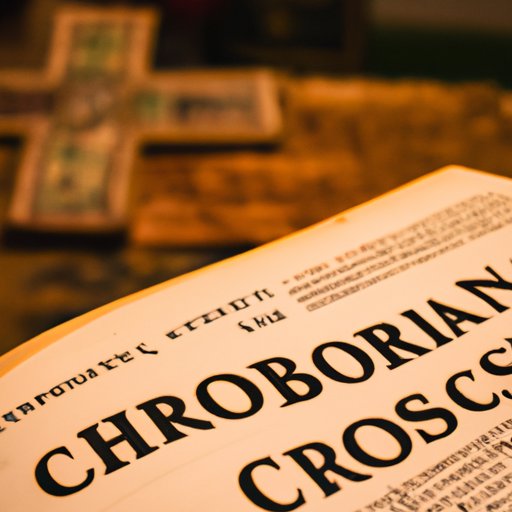Introduction
Christianity is one of the oldest, largest, and most influential religions in the world. Its followers span the globe and its teachings have impacted countless lives. But when was Christianity invented? This question is not easy to answer, as Christianity has evolved over centuries, beginning with its Jewish roots and continuing to develop in new and unexpected ways.
The purpose of this article is to explore the historical origins of Christianity, tracing its emergence from early Jewish influences to its current form. We will examine how Christianity developed over time, including key figures, beliefs, and practices that shaped the religion. We will also investigate the impact of Christianity on society, comparing it to other major world religions.

Exploring the Historical Roots of Christianity
Christianity has its foundations in Judaism, a monotheistic religion practiced by the ancient Israelites. The Hebrew Bible, also known as the Old Testament, contains the sacred writings of the Jewish people and is the foundation for many Christian beliefs. For example, the Ten Commandments, found in the book of Exodus, are fundamental to both Judaism and Christianity.
Jesus of Nazareth, a Jewish teacher and religious leader, is considered to be the founder of Christianity. His teachings, which focused on love, mercy, and justice, formed the basis of what would become the Christian faith. He preached a message of salvation and redemption, and his death and resurrection are central to the Christian belief system.
Tracing the Emergence of Early Christianity
After Jesus’ death, his disciples continued to spread his teachings throughout the region. One of the most influential of these disciples was the Apostle Paul. Paul was a Jewish convert to Christianity who wrote several letters that are now included in the New Testament. His writings provided a framework for Christian belief and practice and helped to spread the religion beyond its Jewish roots.
Early Christian communities began to emerge around the Mediterranean, particularly in the cities of Rome and Antioch. These communities were based on shared beliefs and practices and were largely made up of Gentiles (non-Jews) who had converted to Christianity. As the religion spread, it encountered resistance from the Roman Empire, which saw it as a threat to its traditional polytheistic religion.

Investigating the Development of Christianity Over Time
In the 4th century, Christianity was officially adopted by the Roman Empire as its state religion. This marked a turning point in the history of Christianity, as it allowed the religion to expand and flourish. The church became increasingly organized and structured, with bishops and priests administering the sacraments and overseeing the faithful.
The Reformation of the 16th century marks another important period in the history of Christianity. Led by Martin Luther and other reformers, the Reformation sought to return Christianity to its Biblical roots and end the abuses of the Catholic Church. This led to the formation of Protestant churches and a period of intense debate and division in the Christian world.
Examining the Evolution of Christian Beliefs and Practices
Christianity has evolved over time in terms of its beliefs and practices. Theology and doctrine have been debated and refined in response to changing social and political realities. Worship and rituals have also changed, with some traditions becoming more prominent and others fading away.
Sacraments such as baptism and communion have played a central role in Christian worship since the earliest days of the religion. Other rituals have emerged over time, including prayer, fasting, and pilgrimage. All of these practices are meant to help believers connect with God and deepen their faith.

Analyzing the Impact of Christianity on Society
Christianity has had a profound impact on society over the centuries. Its influence can be seen in politics, art, literature, and even science. Politically, it has shaped governments and laws, while culturally it has inspired countless works of art and music.
On a social level, Christianity has had a powerful effect on individuals and communities. Its teachings have emphasized charity and compassion, leading to the establishment of hospitals, schools, and other institutions dedicated to helping the poor and disadvantaged.
Comparing the Founding of Christianity to Other World Religions
Christianity is similar to other major world religions in many ways. Like Judaism, it is based on a belief in one God and a commitment to ethical living. Similarly, like Islam, it is rooted in a prophetic tradition and emphasizes the importance of community.
However, there are also some key differences between Christianity and other religions. For example, Christianity is centered around the life and teachings of Jesus, while Judaism and Islam focus on different figures. Additionally, Christianity has a unique understanding of salvation, emphasizing grace and forgiveness.
Conclusion
Christianity has a long and complex history, beginning with its Jewish roots and evolving over centuries. Its emergence was shaped by key figures, such as Jesus and Paul, as well as by cultural and political forces. Its beliefs and practices have also changed over time, and it has had a significant impact on society.
In conclusion, Christianity has a rich and varied history, and its founding cannot be easily traced back to a single moment or event. Instead, it has developed over time, influenced by diverse sources and shaped by a variety of cultures and contexts.
(Note: Is this article not meeting your expectations? Do you have knowledge or insights to share? Unlock new opportunities and expand your reach by joining our authors team. Click Registration to join us and share your expertise with our readers.)
